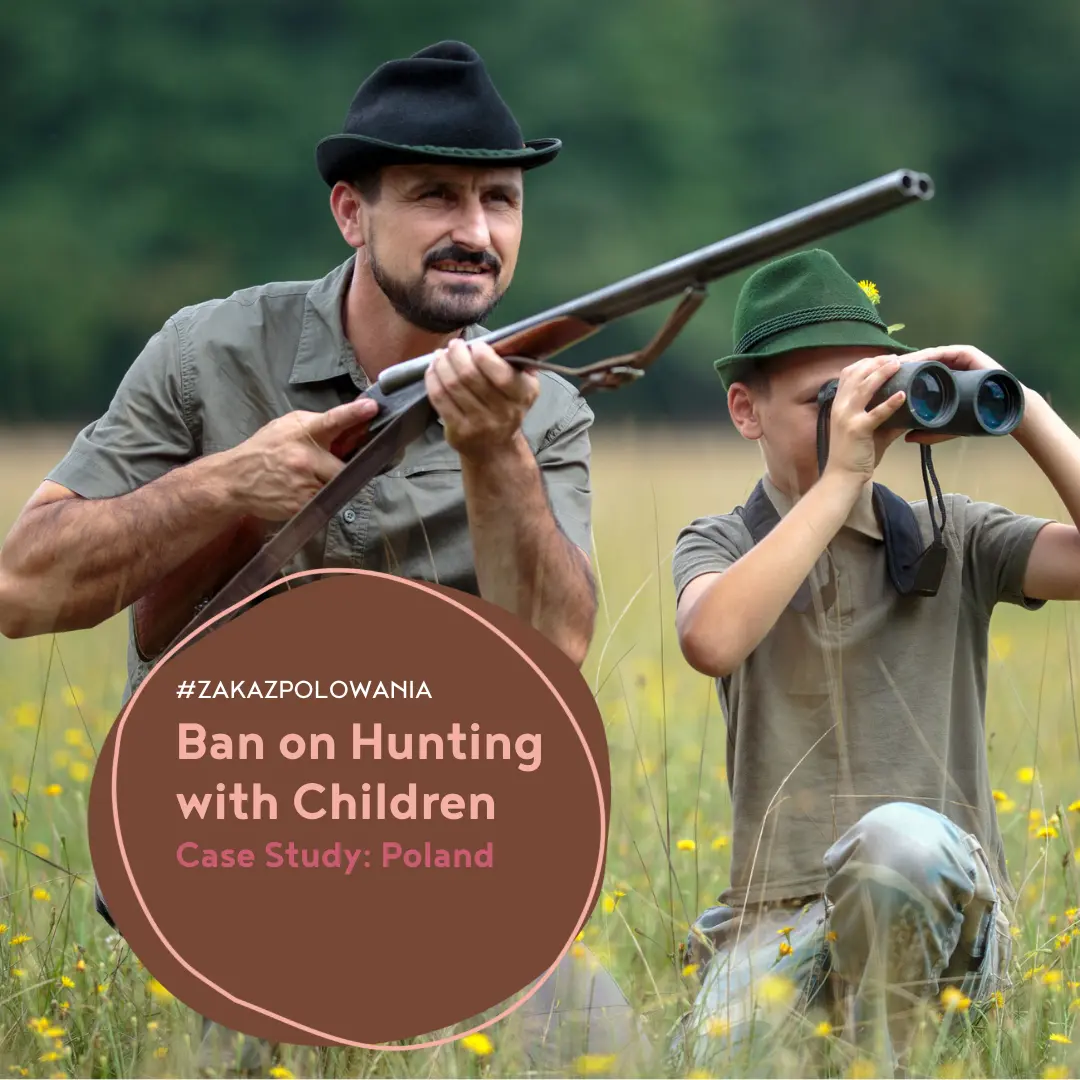Ban on Hunting with Children
Eine deutschsprachige Version dieses Artikels finden Sie hier.
Legal Background: An Overlooked 1997 Protection
Poland's Animal Protection Act of 1997 contained a little-known clause forbidding the killing of vertebrate animals in the presence or participation of children (Article 34 ust. 4 pkt 2). In principle, this meant children should never witness or take part in animal slaughter – a measure intended to protect their mental well-being.
However, the Hunting Law Act, adopted in 1995, predated the Animal Protection Act and was never updated to reflect its child-protection provisions. As a result, for years hunting was effectively treated as an exception. The 1997 ban on killing animals in the presence of children remained unenforced in the context of family hunting outings. Polish hunting customs continued to involve minors, with young people joining their elders on shoots and even ritual post-hunt displays (pokot) of animal carcasses—seemingly in contradiction to the spirit of the newer Animal Protection Act.
This legal gap went largely unnoticed for nearly two decades, until activists and legal experts “connected the dots” in the mid-2010s and began pointing out the inconsistency. They argued that the hunting law needed to be brought into line with both Poland’s existing legal protections for children and modern standards of education.
2015: Public Awareness and Campaign Launch
In 2015, a broad coalition of animal welfare and child rights advocates mobilized to highlight the issue. Under the slogan “Polowanie NIE dla dzieci” (“Hunting NOT for Children”), they organized public demonstrations – notably a rally outside the Polish Parliament (Sejm) in Warsaw on May 26, 2015, where activists held signs with a teddy-bear target logo protesting children’s involvement in hunts. Open letters were delivered to the President and Prime Minister demanding reforms including a ban on minors at hunts.
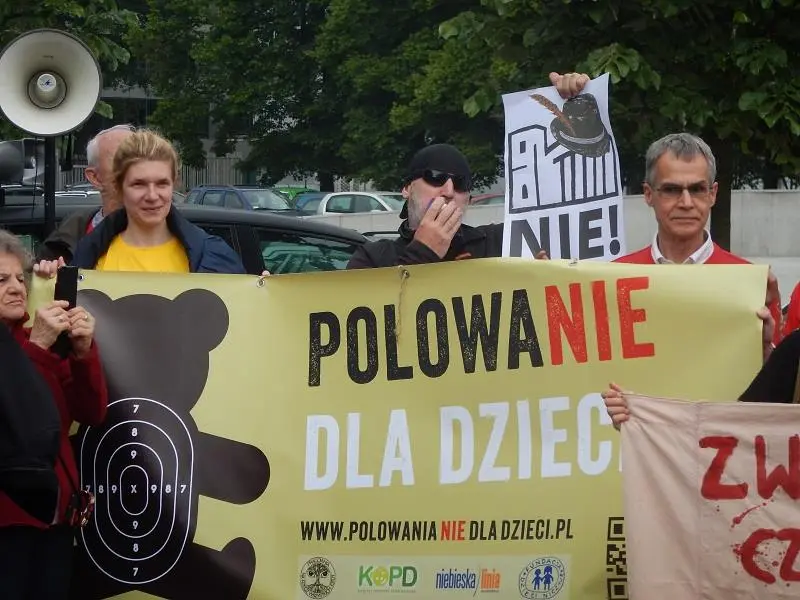
Media outlets began reporting on the emerging consensus that taking part in hunting was harmful for kids. For example, Gazeta Wyborcza published an article titled “Hunting negatively affects children”, quoting experts who warned about psychological damage. Even some within the hunting community acknowledged concerns – Jerzy Żagiell, a regional chairman of the Polish Hunting Association, admitted that times had changed and signaled openness to ending the tradition of taking children hunting. His remarks, however, sparked backlash from traditionalist hunters who felt their parental rights were under attack.
Crucially, 2015 saw Polish scientists and professionals speak out. In April 2015 the Committee on Pedagogical Sciences of the Polish Academy of Sciences issued a statement highlighting the “toxic effect on the socialization of young generations” caused by children participating in hunts. They cited the constitution’s guarantees of child protection from violence and cruelty, and pointed explicitly to the 1997 Animal Protection Act’s ban on killing animals in children’s presence, noting that it carried no exceptions.
Similarly, a group of psychologists at the University of Silesia released an expert opinion warning that exposing children to the traumatic experience of killing animals could have a “detrimental impact on [their] psyche”, far exceeding what their emotional development can bear.
These public statements by educators, child psychologists, and scientists were amplified by NGO campaigns. Organizations devoted to children’s welfare (including UNICEF) joined the chorus. All agreed that routine exposure to the violence of hunting was inappropriate and potentially traumatic for minors
The growing public awareness in 2015 put the issue on the political radar. During a March 2015 parliamentary Environment Committee meeting on the hunting law, Paweł Suski – one of the few non-hunter MPs present – formally proposed adding a ban on under-18s attending hunts, presenting it as a social demand. The idea met stiff resistance from hunting-aligned legislators. Some angrily declared that “it is unacceptable to tell hunters how to raise their children,” framing the matter as an infringement on family tradition. One opposition member even argued (in absurd terms) that children kept away from hunting would end up eating inferior store-bought meat “made from toilet paper” instead of learning to appreciate wild game. Despite such outbursts, the seed of reform had been planted: by mid-2015, the presence of children at hunts was widely debated, and the once-overlooked 1997 prohibition was now common knowledge.
Building Momentum: Expert Support and Advocacy (2016–2017)
In the years that followed, activists built a strong evidence-based case and broadened their coalition. The Children’s Rights Ombudsman, Marek Michalak, weighed in to support the ban. The Ministry of National Education and two different committees of the Polish Academy of Sciences (the Pedagogy committee and the Psychology committee) each issued opinions agreeing that minors should not be involved in hunting. Prominent Polish psychologists lent their voices: for instance, Mirosława Kątna of the Committee for the Protection of Children's Rights stressed that hunting falls far outside any acceptable childhood experience. She noted that a child’s developmental stages are the same in a hunting family as in any family – “if a family has a tradition of serving alcohol, that doesn’t mean you give it to the kids” – drawing an analogy to illustrate the risk of emotional harm. “Participating in a hunt is beyond the measure of a child’s age,” Kątna explained, urging respect for children’s psychological fragility.
NGOs continued to keep the issue in the public eye through articles, petitions, and educational outreach. The ecological monthly Dzikie Życie ran interviews and essays on the topic. Activists frequently cited studies linking childhood exposure to animal cruelty with a greater propensity for violence later in life. As these insights spread, public opinion increasingly aligned with the reformers. Importantly, the Niech Żyją! coalition and allied NGOs sustained pressure on policymakers. They participated in legislative consultations and committee hearings, ensuring expert testimonies and citizens’ petitions were on record. By late 2016, the ruling parliamentary majority (the conservative PiS party) was drafting a comprehensive amendment to the hunting law – partly to address unrelated issues raised by a 2014 Constitutional Tribunal ruling regarding hunting on private land, but also opening the door to long-sought ethical reforms. Advocacy groups seized this opportunity to push for the inclusion of the under-18 ban, alongside other animal welfare measures.
Behind the scenes, key individuals were building consensus. Policymakers across party lines were surprisingly receptive to protecting children from hunting violence, an issue that transcended typical ideological divides. Paweł Suski (Civic Platform, PO) and Gabriela Lenartowicz (also PO) championed the cause in the opposition, while within the PiS government figures like Minister Henryk Kowalczyk (who took over the environment portfolio in early 2018) proved willing to adopt some pro-animal proposals. By early 2018, there was an unusual cross-party alignment: as activist Paweł Średziński observed, the reform became possible “thanks to an agreement above political divisions”. This reflected a broad social consensus that had formed – surveys showed a large majority of Poles, whether urban liberals or rural conservatives, agreed that children should be kept away from the violence of hunting.
Legislative Breakthrough in 2018
In March 2018, after years of debate, Poland enacted a landmark revision of the Hunting Law that, among other things, banned minors from participating in or attending hunts. The new provisions – Article 42aa point 15 and Article 52 point 7 of the Hunting Law – made it illegal “to perform a hunt in the presence or with the participation of children under 18 years of age,” with violations punishable by fines, restriction of liberty, or up to one year in prison. The vote in the Sejm (lower house) showed overwhelming support: 335 deputies voted in favor of the ban, versus 73 agains. Notably, the ruling PiS party threw its weight behind the reform (197 out of 221 PiS deputies supported it), joined by almost all Civic Platform (PO) deputies and most other groups. Only a handful of conservative and agrarian lawmakers (especially from PSL and the Kukiz’15 alliance) opposed the change – some of whom had argued in vain that “raising children apart from hunting” violated tradition. But their stance was decisively rejected. As one hunting magazine grudgingly noted, lawmakers across the spectrum viewed the idea of taking kids on hunts as a “horrendum” – something horrifying and unacceptable. The Parliament’s message was clear: children’s right to a violence-free upbringing outweighed any claims of hunting custom.
The legislative process was not without last-minute drama. When the bill moved to the Senate in March 2018, a group of hunting enthusiasts in the Senate sought to dilute the under-18 rule. They introduced an amendment to lower the minimum age to 15, among other changes favoring hunters. Senators Józef Łyczak, Zdzisław Pupa, and Józef Zając (all hunters or allies of the hunting lobby) led a spirited defense of the old ways. During the Senate debate on March 14, 2018, Senator Łyczak invoked religion, claiming that humans have a God-given mandate to subdue nature (even paraphrasing the Bible’s “fill the earth and subdue it” in support of hunting). He also insisted that at least teenagers should be allowed to hunt, suggesting that “hunting instills love for nature and animals” – conveniently ignoring the fact that such “love” was expressed through firing lead bullets at wildlife. Another senator argued that banning kids would drive them to worse pursuits, like violent video games, quipping “Better a rifle than a joystick” as a cure for youth boredom. Despite these colorful objections, the Senate ultimately bowed to public pressure. It approved the law with the full under-18 ban intact – the attempt to weaken it to 15 years was defeated.
The final act, signed by President Andrzej Duda and entering into force in April 2018, made Poland the first country in Europe to categorically prohibit minors from attending hunts. As activist Radosław Ślusarczyk of Workshop for All Beings declared, this victory marked “the end of the Rzeczpospolita Myśliwska (Hunters’ Republic)” – after years of effort, the hunting lobby had been overcome by a broad alliance of citizens and experts, making Poland’s wilderness “safer for people and wildlife”.
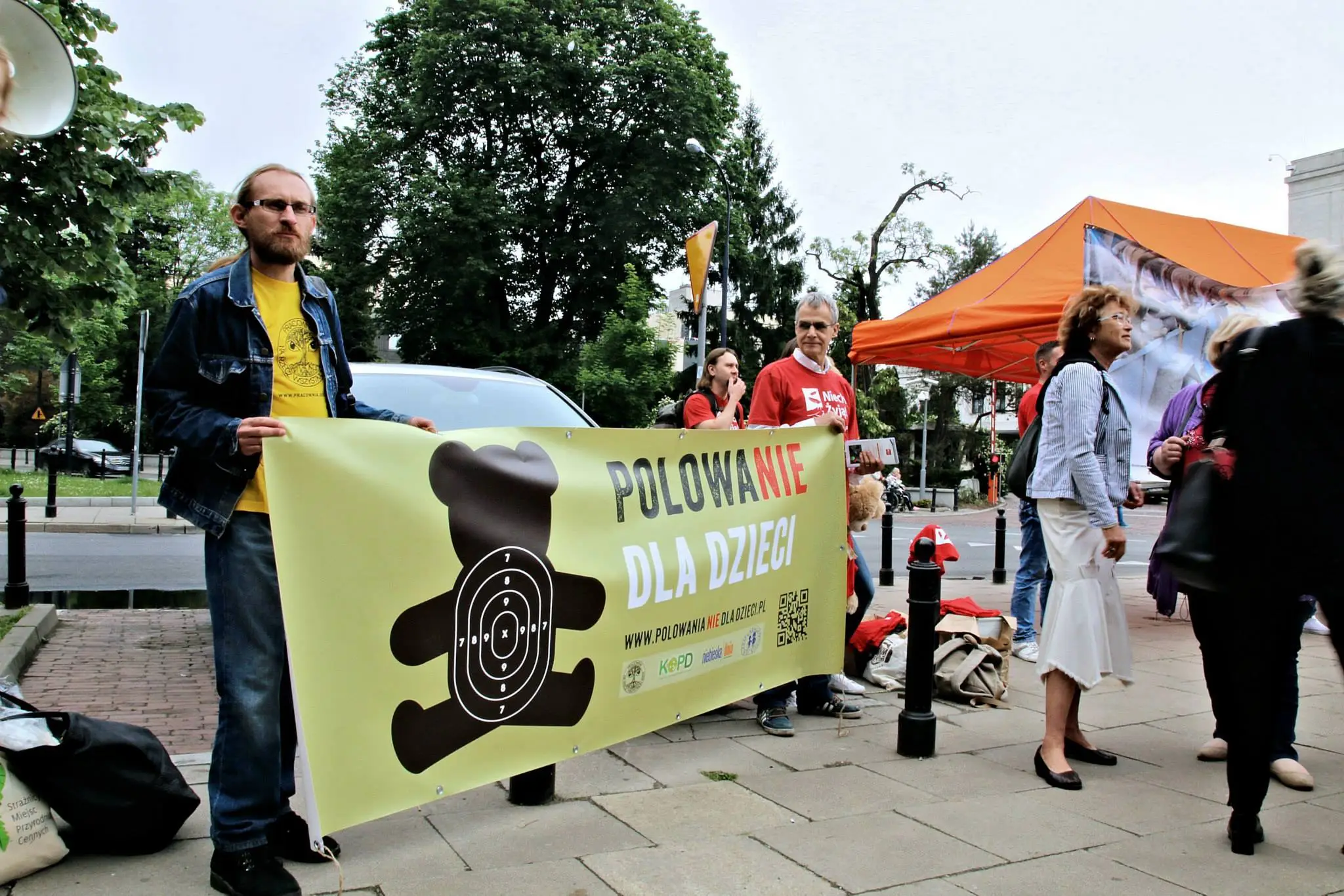
Hunter Lobby Backlash and Attempts to Reverse the Ban (2018–2022)
Unsurprisingly, the hunting establishment reacted swiftly and angrily to the new law – especially the prohibition on bringing children to hunts. The Polish Hunting Association (PZŁ) and its allies framed the ban as an attack on tradition and family rights. The National Hunting Council publicly complained that “our children can no longer be with us on hunts, and thus cannot learn about nature”, portraying hunting as wholesome family outdoor education. PZŁ social media channels circulated infographics extolling the supposed virtues of taking kids hunting – claiming it builds physical fitness, parent-child bonds, respect for nature, and an understanding of where meat comes from. (Tellingly, this promotional graphic was deleted after just one day online, as it quickly drew ridicule and criticism.)
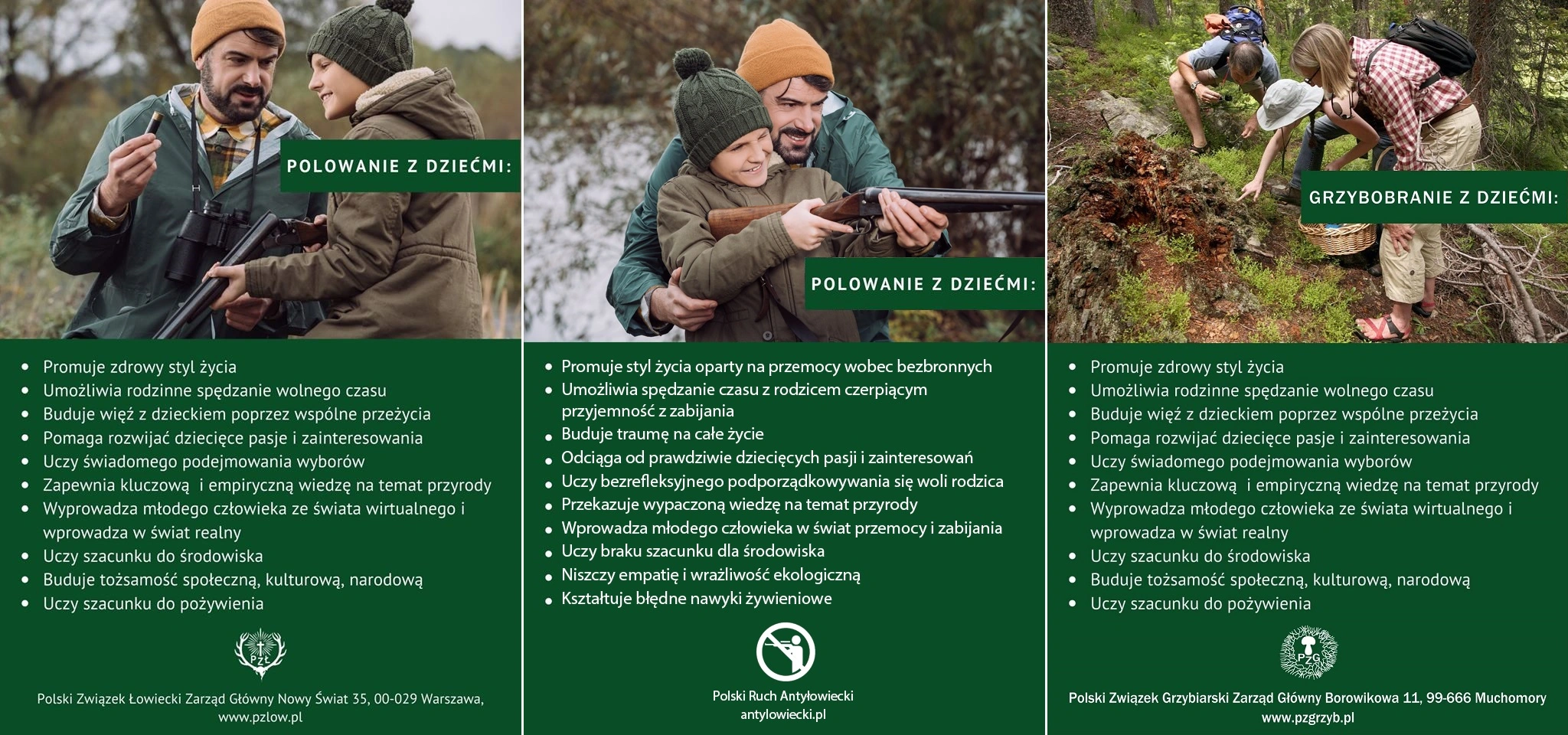
In 2018, shortly after the new law came into force, a group of pro-hunting Members of Parliament filed a constitutional complaint (case K 4/18) with the Polish Constitutional Tribunal. They argued that the ban on hunting in the presence of minors violated constitutional principles such as parental rights (Article 48), freedom of assembly (Article 58), and legal certainty. However, in February 2019, the Prosecutor General of Poland submitted a formal opinion rejecting the complaint. He firmly upheld the constitutionality of the ban, emphasizing the state’s obligation to protect children from exposure to violence and cruelty. The Prosecutor General argued that hunting constitutes a form of intentional killing of animals, and that shielding minors from such acts is a legitimate goal consistent with the Constitution and the 1997 Animal Protection Act. The Tribunal ultimately did not overturn the provision, and the ban on minors at hunts remains in effect.
More concretely, the hunting lobby launched multiple efforts to overturn or water down the ban. In late 2018, barely a year after the new law took effect, PZŁ floated the idea of getting Polish hunting recognized by UNESCO as intangible cultural heritage. Observers saw this as an attempt to leverage “tradition” status to undermine the ban – particularly the tradition of passing on hunting skills within families. The UNESCO bid failed to gain traction.
Next, in 2019, hunters found a sympathetic ear in the Ministry of Environment. Although the statute still forbade under-18s from any participation in a hunt, the Environment Minister (himself a hunter) issued a new regulation tweaking the official “Hunting Rulebook.” This 2019 regulation allowed that children could be present at certain non-lethal moments – for example, they might attend the pre-hunt briefing or post-hunt meals – so long as they did not take part in the chase, the kill, or the post-mortem display of animals. It was a partial rollback via executive rules: minors still could not join the hunt proper (no involvement in tracking, shooting, or handling slain animals), and they were barred from the ritual laying out of dead game (the pokot). But the change gave a small opening for hunters to bring children along to the hunting ground periphery. For the hunting lobby, however, this concession was “far too little” – they wanted the entire ban gone.
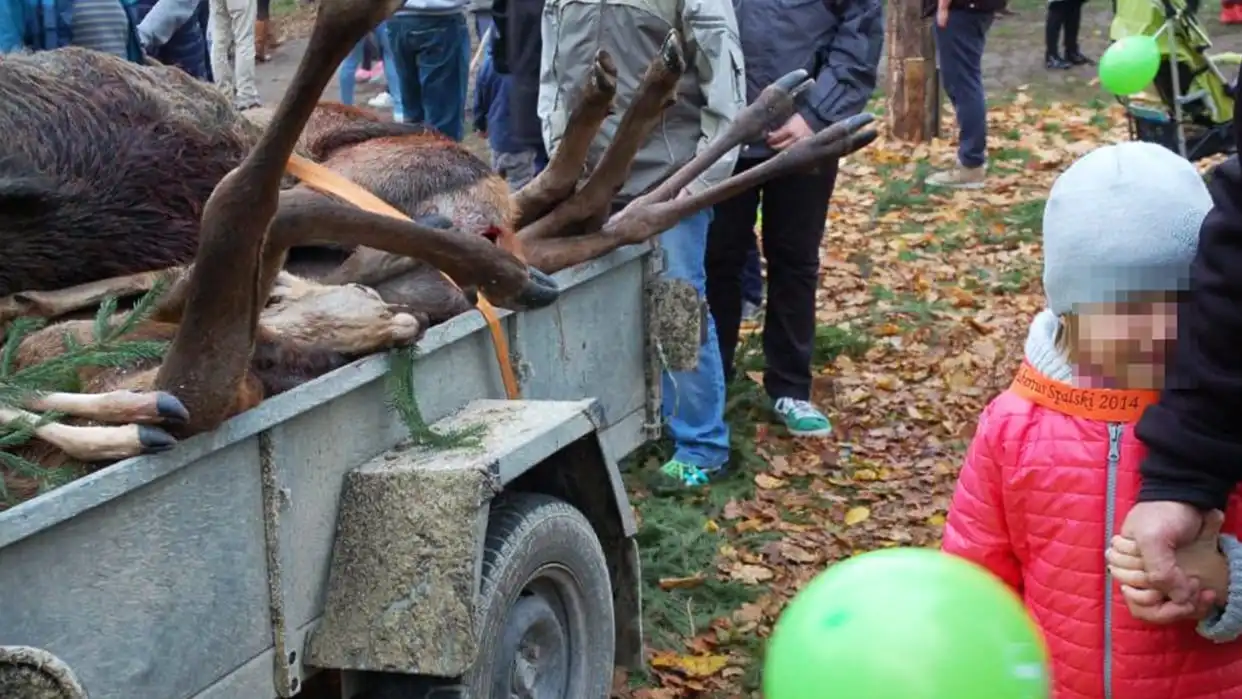
Emboldened, a coalition of hunting organizations took a more direct approach. They organized a citizens’ legislative initiative titled “Krzewienie Tradycji Łowieckiej” (“Fostering Hunting Tradition”), gathering public signatures for a bill to re-allow children at hunts. In October 2019, this bill was submitted to the Sejm, formally sponsored by PZŁ’s national chairman Rafał Malec. It proposed to amend the law to permit minors to hunt “with the consent of parents or guardians.” Essentially, it aimed to add an exception to the 2018 ban: if parents approved, a child could accompany them, and neither the adult nor organizers would face any penalty. Opponents noted that this caveat would gut the ban entirely, since it was hunters’ own children who were typically involved in the first place.
The initiative also received support from abroad. FACE published an official statement endorsing the Polish proposal. In its April 2020 communiqué, FACE welcomed the draft law as a “positive step,” expressing regret that Poland had introduced such a strict ban in the first place. The federation framed youth hunting participation as an educational tool that fosters “understanding of nature, responsibility and sustainable use of natural resources,” and it called on the Polish Parliament to reverse what it described as a “regrettable” restriction on family hunting traditions.
The citizen bill reached its first reading on 15 April 2020 – right in the early days of the COVID-19 pandemic. Even amid the crisis, NGOs and experts rallied to confront it. A powerful joint open letter was sent to the Speaker of the Sejm by an alliance of child rights and environmental organizations. They urged Parliament to reject the rollback, “strongly opposing the killing of animals in the presence of minors for pedagogical, psychological, social and legal reasons.” The letter emphasized that allowing children to witness “brutal, violent and cruel behavior by hunters toward animals – injuring them, finishing them off, quartering their bodies, and finally exhibiting them – had resulted in traumas that haunted children even in adulthood.” It warned that this “early hunting indoctrination” teaches a dehumanizing, objectifying attitude toward nature, conveying that it is acceptable to take life for one’s pleasure. These arguments were backed by citations of Polish law and international obligations: the advocates noted that Polish schools don’t take kids on field trips to abattoirs, and by the same logic children shouldn’t be led to scenes of violence in the forest. They also invoked Article 19 of the UN Convention on the Rights of the Child (which Poland has ratified), requiring protection of children from all forms of physical or mental violence.
Thanks to such pressure and near-unanimous expert condemnation, the 2020 “pro-hunting tradition” bill stalled. Parliamentary records show that the Sejm’s Environment Committee voted to reject the proposal in its first reading, preventing it from moving forward. The Children’s Rights Ombudsman and even the government’s Education Ministry had also issued negative opinions, making it politically difficult to justify overturning the ban.
See also: Hunting association launches “My First Hunt” children’s story contest to lobby against ban on minors
However, the hunting lobby did not give up. In 2022, another attempt emerged – this time under the guise of a broader deregulation effort. In September 2022, pro-hunting legislators slipped provisions into a catch-all “law to remove unnecessary administrative barriers” that, buried among dozens of unrelated clauses, would amend the hunting law to allow under-18s “with parental consent”. Observers noted this “backdoor” approach was a direct ploy by the hunters’ lobby to achieve through stealth what they could not win openly. Once again, environmental NGOs sounded the alarm. Once publicized, the 2022 gambit provoked outrage and became a political hot potato. By early December 2022, a special parliamentary commission had put the contentious articles on hold. The government, facing public scrutiny, hesitated to push the change through in the run-up to elections. As of 2025, the ban on underage hunting participation remains in force, standing as a hard-won protection – though vigilance is still needed, as hunters periodically lobby for its reversal.
Conclusion
Poland’s ban on hunting in the presence of minors offers a compelling case study in activist persistence and effective alliance-building. A reform that once seemed unlikely – given the country’s deep-rooted hunting culture – was realized through a combination of legal insight, public campaigning, and expert advocacy. Activists first unearthed a forgotten legal principle (the 1997 animal protection clause) and used it as a moral and legal anchor. They then rallied diverse stakeholders: animal welfare groups, child psychologists, educators, pediatricians, and human rights organizations, uniting them around a clear message that children should be off-limits from organized killing. By generating media coverage and educational materials, they shifted public opinion and shamed policymakers into action. Key Polish institutions spoke with one voice – from the Polish Academy of Sciences and the Ombudsman for Children, to respected NGOs and even religious figures – all underscoring that exposing kids to cruelty violates both scientific knowledge and Poland’s constitutional duty to protect the young from violence. This broad societal consensus empowered politicians across party lines to support the ban in 2018, making it a rare example of bipartisan cooperation on a social issue.
The implementation of the ban was not the end of the story. The subsequent backlash demonstrated that well-entrenched lobbies will continually seek to undo changes that threaten their traditions or interests. In Poland’s case, the hunting lobby employed various tactics – cultural appeals, regulatory tweaks, and legislative maneuvers – to try to erode the reform. Each time, however, civil society was ready to respond with facts, petitions, and public pressure, thereby safeguarding the law. Activists drew on harrowing testimonies of children traumatized by hunts and research linking childhood exposure to animal cruelty with later antisocial behavior. They also invoked Poland’s legal framework: not only the Animal Protection Act, but also constitutional guarantees and international child rights norms. This framing elevated the issue from a niche debate to one of fundamental rights and child welfare.
